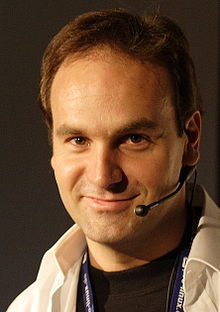Background
Shuttleworth was born in Welkom, Free State, South Africa as a son of a surgeon and a nursery school teacher.


entrepreneur Foundation administrator
Shuttleworth was born in Welkom, Free State, South Africa as a son of a surgeon and a nursery school teacher.
He attended Rondebosch Boys' High School and then Western Province Preparatory School and Diocesan College.
Shuttleworth obtained a Business Science degree in Finance and Information Systems at the University of Cape Town.
In 1995 he founded Thawte, a consulting firm that became a world leader in Internet security for electronic commerce. He sold the firm in 1999 to the U.S.-based company VeriSign and with his profits founded a venture capital firm and a nonprofit organization dedicated to funding education initiatives in Africa. He lived in Smuts Hall, where he was involved in the installation of the first residential Internet coShuttleworth founded Thawte in 1995, which specialised in digital certificates and Internet security and then sold it to VeriSign in December 1999, earning R 3.5 billion (about US$ 575 million at the time).
In September 2000, Shuttleworth formed HBD Venture Capital, a business incubator and venture capital provider. In March 2004 he formed Canonical Ltd., for the promotion and commercial support of free software projects. In December 2009, Shuttleworth stepped down as the CEO of Canonical, Ltd.
In the 1990s, Shuttleworth participated as one of the developers of the Debian operating system.
In 2001 he formed the Shuttleworth Foundation, a nonprofit organisation dedicated to social innovation which also funds educational, free, and open source software projects in South Africa, such as the Freedom Toaster.
In 2004 he returned to the free software world by funding the development of Ubuntu, a Linux distribution based on Debian, through his company Canonical Ltd.
Mark Shuttleworth delivering a talk during the Ubuntu Party in Paris, France, in November 2009.
In 2005 he founded the Ubuntu Foundation and made an initial investment of 10 million dollars. In the Ubuntu project, Shuttleworth is often referred to with the tongue-in-cheek title "Self-Appointed Benevolent Dictator for Life" (SABDFL). To come up with a list of names of people to hire for the project, Shuttleworth took six months of Debian mailing list archives with him while travelling to Antarctica aboard the icebreaker Kapitan Khlebnikov in early 2004. In September 2005, he purchased a 65% stake of Impi Linux.
On 15 October 2006, it was announced that Mark Shuttleworth became the first patron of KDE, the highest level of sponsorship available. This patronship ended in 2012, together with financial support for Kubuntu, the Ubuntu variant with KDE as main desktop.
On 17 December 2009, Mark announced that, effective March 2010, he would step down as CEO of Canonical to focus energy on product design, partnership, and customers. Jane Silber, COO at Canonical since 2004, took on the job of CEO at Canonical.
In September 2010, he received an honorary degree from the Open University for this work.
On 9 November 2012. Shuttleworth and Kenneth Rogoff took part in a debate opposite Garry Kasparov and Peter Thiel at the Oxford Union, entitled "The Innovation Enigma".
He has a private jet, a Bombardier Global Express, which is often referred to as Canonical One but is in fact owned through his HBD Venture Capital company. The dragon depicted on the side of the plane is Norman, the HBD Venture Capital mascot.
He is the first African private cosmonaut to fly in space aboard the Soyuz mission TM34 to the International Space Station from the Baikonur Cosmodrome in Kazakhstan, Russia in April, 2002.
On 25 October 2013 Shuttleworth and Ubuntu were awarded the Austrian anti-privacy Big Brother Award for sending local Ubuntu Unity Dash searches to Canonical servers by default. A year earlier in 2012 Shuttleworth had defended the anonymisation method used.
Shuttleworth gained worldwide fame on 25 April 2002 as the second self-funded space tourist and the first-ever South African in space. Flying through Space Adventures, he launched aboard the Russian Soyuz TM-34 mission as a spaceflight participant, paying approximately United States$ 20 million for the voyage. Two days later, the Soyuz spacecraft arrived at the International Space Station, where he spent eight days participating in experiments related to AIDS and genome research. On 5 May 2002, he returned to Earth on Soyuz TM-33. In order to participate in the flight, Shuttleworth had to undergo one year of training and preparation, including seven months spent in Star City, Russia.
While in space he had a radio conversation with Nelson Mandela and a 14-year-old South African girl, Michelle Foster, who asked him to marry her. He politely dodged the question, stating that he was "very honoured at the question" before changing the subject. The terminally ill Foster was provided the opportunity to have a conversation with Mark Shuttleworth and Nelson Mandela by the Reach for a Dream foundation.
